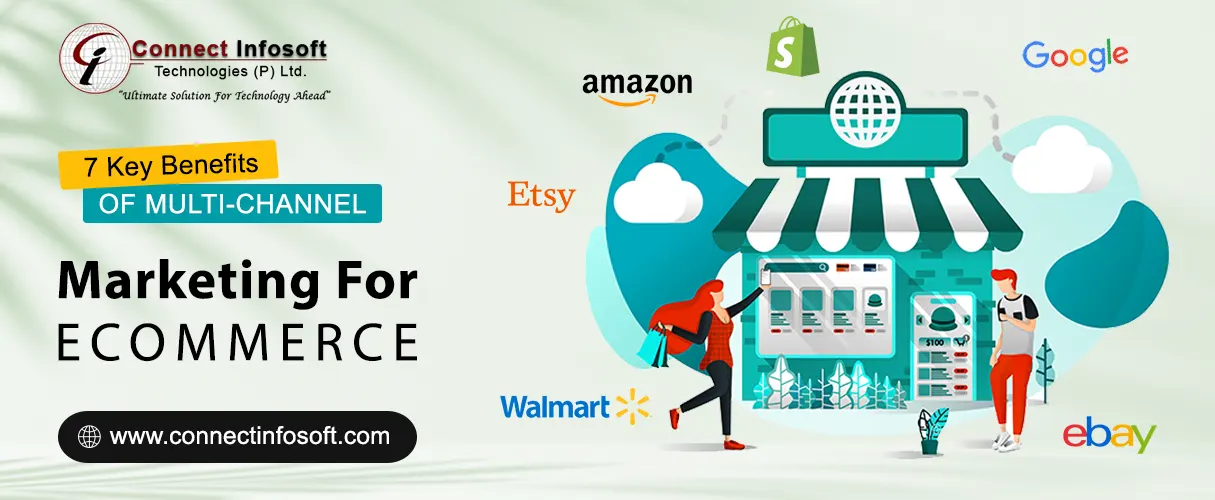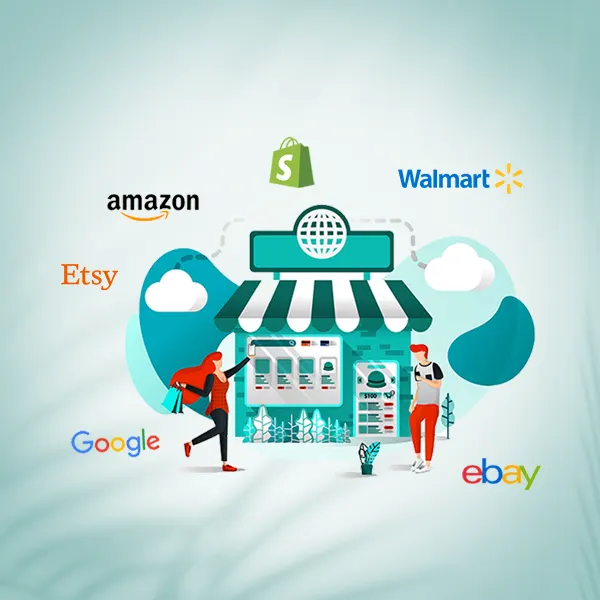7 Key Benefits Of Multi-Channel Marketing For eCommerce Businesses

The success of an ecommerce business depends on its ability to reach customers through multiple channels. With the rise of online marketplaces, social media platforms, mobile apps, and more, a multi-channel marketing strategy has become essential for businesses to thrive. This blog explores, what a multi-channel marketing strategy is and highlights the seven key benefits it brings to ecommerce businesses.
What is a Multi-Channel Marketing Strategy?
A multi-channel marketing strategy refers to the practice of utilizing various marketing channels to connect with customers and promote products or services. It involves reaching potential customers through different platforms, both online and offline. These channels may include a combination of social media, websites, email marketing, mobile apps, physical stores, marketplaces, and more. The goal is to deliver a consistent brand message and provide customers with a seamless experience across all touch points.
Benefits of Multi-Channel Marketing for Ecommerce
1. Wider Reach and Increased Visibility:
Adopting a multi-channel marketing approach, ecommerce businesses can expand their reach and gain exposure to a broader audience. Each channel presents an opportunity to connect with potential customers who may have different preferences and browsing habits. Diversifying marketing efforts across multiple platforms increases the chances of reaching and engaging with a larger pool of prospective buyers.
2. Enhanced Customer Engagement:
Multi-channel marketing allows businesses to engage with customers at various stages of the buying journey. By providing consistent messaging and personalized experiences across channels, ecommerce companies can build stronger connections with their target audience. Engaging customers through social media, email campaigns, content marketing, and other channels fosters brand loyalty, encourages repeat purchases, and drives customer advocacy.
3. Improved Customer Experience:
Offering a seamless and cohesive customer experience is crucial for ecommerce success. Multi-channel marketing enables businesses to provide convenience and flexibility to customers by allowing them to choose their preferred channels for browsing, researching, and purchasing products. Whether it's a website, mobile app, social media platform, or physical store, customers can interact with the brand in a way that suits their preferences, leading to a more satisfying and personalized shopping experience.
4. Data Collection and Insights:
Each marketing channel generates valuable data about customer behavior, preferences, and demographics. A multi-channel strategy enables businesses to gather data from various touch points, providing a comprehensive view of customer interactions. By analyzing this data, ecommerce companies can gain insights into customer preferences, optimize marketing campaigns, personalize offers, and improve overall business strategies.
5. Increased Sales and Revenue:
Reaching customers through multiple channels, ecommerce businesses can significantly boost their sales and revenue. A well-executed multi-channel marketing strategy ensures that products and promotions are accessible to customers wherever they prefer to shop. This increased visibility and accessibility can lead to higher conversion rates, larger order values, and more frequent purchases, ultimately driving revenue growth.
6. Competitive Advantage:
In the highly competitive ecommerce landscape, a multi-channel marketing strategy can provide a significant edge over competitors. By diversifying marketing efforts across different channels, businesses can differentiate themselves and capture the attention of potential customers who may be loyal to specific platforms. A strong presence across multiple channels strengthens brand visibility and can help position a business as a leader in its niche.
7. Adaptability and Future-Proofing:
The digital landscape is constantly evolving, and consumer preferences and behaviors change over time. Adopting a multi-channel marketing strategy allows ecommerce businesses to adapt to these changes and stay ahead of the curve. By being present on various channels, businesses can quickly pivot and adjust their marketing efforts based on emerging trends and customer demands, ensuring long-term success and sustainability.
Conclusion:
A multi-channel marketing strategy is a vital component of any successful ecommerce business. By leveraging multiple channels, businesses can increase their reach, engage with customers at various touch points, provide a seamless shopping experience, collect valuable data, drive sales, gain a competitive advantage, and adapt to changing market dynamics. Embracing a multi-channel approach empowers ecommerce businesses to connect with customers on their terms and maximize their growth potential in today's digital world.


